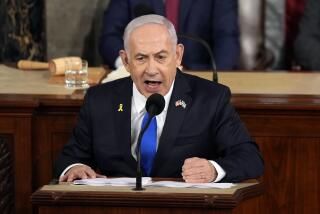Key Israel Vote Supports Lavi Fighter Plane
- Share via
JERUSALEM — Israeli lawmakers voted overwhelmingly to continue the controversial Lavi jet fighter development project Sunday in an action that is non-binding but is seen nevertheless as an important indication of continued political support for the program.
The action came at an extraordinary joint meeting of the Knesset (Parliament) Foreign Affairs and Finance committees, where the final tally showed 22 lawmakers in favor of continuing the multibillion-dollar project, with 6 opposed and 3 abstentions.
The final decision on whether to proceed with the Lavi must be made by the Cabinet, which is not bound by the committees’ recommendation. The vote, however, suggests that the project’s proponents are in a strong position to prevail.
The United States, which has bankrolled virtually all of the Lavi’s $1.5-billion cost to date, has become increasingly disenchanted with the program as it developed that the super-sophisticated fighter will cost about twice as much as originally planned. According to latest estimates, the Lavi program will now cost about $2.5 billion more than the alternative of buying American-made F-16s.
Critics in the Israeli armed forces argue that the aircraft will require such a large share of the country’s overall defense budget as it moves into the production stage that other branches will be starved of needed funds for training and weapons development.
Last month, State Comptroller Yaakov Maltz, the government’s chief ombudsman, charged in his annual report to the Knesset that successive Israeli Cabinets have voted to pursue the Lavi program on the basis of “groundless, insufficient, tendentious and incorrect assessments of (the program’s) cost.” The program was originally approved in 1980.
No Economic Justification
Another critic is Michael Bruno, governor of the Bank of Israel, who said in late June that there is no economic justification for the Lavi and that the government has “no choice but to immediately halt the project.”
However, the Lavi’s proponents, including Prime Minister Yitzhak Shamir and Foreign Minister Shimon Peres, the major partners in the current coalition government, argue that the plane is important as a national--not just military--project. They say to cancel it now would be a damaging blow to the country’s prestige.
Israeli Cabinet ministers have discussed the program several times in recent weeks, but no final vote has been scheduled.
In an unrelated development, the Cabinet voted at its regular Sunday meeting to give the Arab-owned East Jerusalem Electric Co. a modified concession to supply power to Palestinian residents of the city and parts of the occupied West Bank. That decision, which is more important for its political symbolism than for its economic impact, followed the rejection of an alternate proposal for the Jewish-run Israeli Electric Co. to take over the concession.
Initiative of Far Right
The defeated proposal, an initiative of the political far right, was intended to underline Israel’s claim to perpetual sovereignty over united Jerusalem.
The Arab firm has been plagued by rising debts and deteriorating equipment for several years. At present, it owes about $20 million to the Israeli Electric Co., from which it buys much of the power it supplies to about 30,000 Jewish and 70,000 Arab customers.
The company’s concession, which dates from the early days of British rule in Palestine after World War I, was due to expire at the end of this year.
Under an agreement with the Israeli Ministry of Energy that was reportedly a condition for extending the Arab firm’s concession for at least another decade, the East Jerusalem company will turn over a portion of its equipment and its Jewish customers to Israeli Electric. It will also dismiss about half of its work force as an economy measure.
Palestinian Symbol
Israel Electric, in turn, is to forgive most or all of East Jerusalem Electric’s debt. The East Jerusalem company has long been viewed as a symbol of the continued Palestinian claim to land captured by Israel in the Six-Day War of 1967, and its politically active workers’ committee said it will oppose even the compromise Cabinet decision.
However, other Palestinian sources said the deal has “positive points” that will make life easier for all parties concerned.
More to Read
Sign up for Essential California
The most important California stories and recommendations in your inbox every morning.
You may occasionally receive promotional content from the Los Angeles Times.










